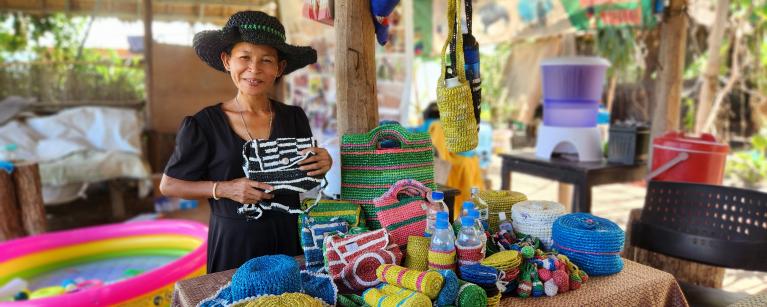The Women Plastic Waste Recycling Group, established in 2023 in Sangkat Chreav, Siem Reap province, serves as a remarkable example of community-led initiatives aimed at tackling environmental challenges while promoting economic empowerment for women. This initiative was facilitated by Fisheries Action Coalition Team (FACT) as part of the EU-CAPFISH/FOSTER project, funded by the European Union and led by Oxfam. The project emphasizes the importance of local participation in sustainable practices.
Initially composed of just three members, the Women Plastic Waste Recycling Group has expanded to twelve dedicated women. FACT has played a crucial role in providing training on market strategies and quality production. These training sessions have equipped group members with the skills necessary to effectively showcase their recycled products at various events, including the “One Village One Product” initiative and the Tonle Sap Ecotourism Network (TEN). This exposure not only enhances visibility but also facilitates sales in local markets, establishing a robust connection between eco-tourism and the community’s entrepreneurial efforts.
Despite these advancements, the group has encountered significant challenges. One of the primary difficulties has been the lack of a communal workspace and a showroom for their products. Recognizing this obstacle, FACT stepped in to support the construction of a dedicated center for the group, providing a physical space where members can collaborate, produce, and display their work.
Ms. Sitha Mut, the leader of the group, exemplifies the transformative impact of the project. Her journey from a reserved individual to a confident leader highlights the empowerment that comes from participation in such initiatives. Sitha emphasizes the importance of women earning income to support their families, thereby improving their overall livelihoods. Her leadership has inspired other women in the community to engage in recycling efforts, fostering a collective spirit of empowerment and collaboration.
The group has successfully developed a range of souvenirs made from recycled plastic, including bracelets, keychains, and bags. This initiative has generated a monthly income ranging from $150 to $200 per group. Sitha reported an average annual earnings of approximately $1,400, which she utilizes to meet her family’s basic needs, illustrating the direct economic benefits of the initiative for its members.
Beyond the economic advantages, the Women Plastic Waste Recycling Group makes a significant contribution to environmental sustainability. The group recycles approximately 10 kilograms of plastic waste weekly, playing a vital role in cleaning up the local environment and promoting ecological awareness within the community. This dual impact—economic empowerment and environmental stewardship—underscores the importance of community-based recycling efforts.
The Women Plastic Waste Recycling Group stands as a testament to the power of local initiatives in addressing both economic and environmental challenges. By fostering women’s empowerment and promoting sustainable practices, the group not only enhances the livelihoods of its members but also contributes to a cleaner, more sustainable environment. This case study highlights the potential of community-led projects to create meaningful change, encouraging further investment and support for similar initiatives in the future.
Text by: Menghout Lay & Bunly Minh/FACT & Chong Ear
